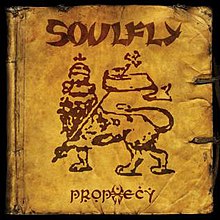Prophecy (Soulfly album)
| Prophecy | ||||
|---|---|---|---|---|
 |
||||
| Studio album by Soulfly | ||||
| Released | March 30, 2004 | |||
| Recorded | Fall 2003 at The Saltmine Studio Oasis in Mesa, Arizona | |||
| Genre | ||||
| Length | 56:53 78:40 (Digipak) |
|||
| Label | Roadrunner | |||
| Producer | Max Cavalera | |||
| Soulfly chronology | ||||
|
||||
| Alternative Cover | ||||

Re-issued Digipak cover
|
||||
| Professional ratings | |
|---|---|
| Review scores | |
| Source | Rating |
| Allmusic | |
| ARTISTdirect | |
| Blabbermouth.net | |
| Rock Hard (de) | 9/10 |
Prophecy is the fourth studio album by the metal band Soulfly and it was released in 2004.
This album is noteworthy for three features — the completely different line-up for the album apart from leader Max Cavalera, the world music influence from a stint that Cavalera spent in Serbia and explicit Spirituality themes on the album. The album has gone on to sell over 275,000 copies.
Cavalera recruited a whole new line-up for the Prophecy album. Joe Nunez was back behind the drum kit having worked on the Primitive album with Marc Rizzo formerly of Ill Niño on guitar. There are two bassists playing as members of Soulfly on Prophecy – David Ellefson of Megadeth and Bobby Burns of Primer 55. Cavalera took this decision to have a mixture of old school metal and death metal on the album.
Max Cavalera explains on Roadrunner Records website that he wants to use different musicians as part of the group for each album. "This is an approach that I've wanted to do for a while. I never wanted Soulfly to be a band like Metallica, with the same four guys. On every Soulfly album, we've changed the line-up and it will probably continue that way. In order to do that, I had to start from the inside out and bring in people who caught my attention, that I had never played with before, and create this."
After the release of this album, he would go on to keep these musicians as he felt they worked with him the best.
In Sepultura, Cavelera had shown an interest in world music as shown on the 1996 Roots album featuring elements of the music of Brazil's indigenous peoples. This approach continues on the Prophecy album with Cavalera travelling to Serbia to record with traditional musicians. On the track "Moses", an explicit statement of his religious beliefs he works with Serbian band Eyesburn featuring reggae influences. Other tracks on the album feature instruments from the Middle Ages, sheepskin bagpipes and Serbian Gypsies.
...
Wikipedia
